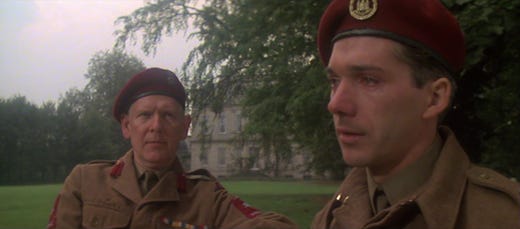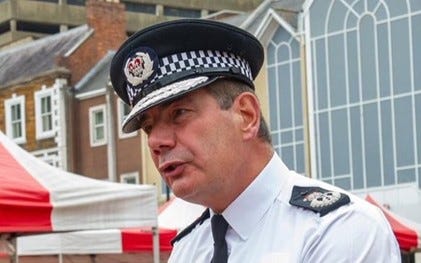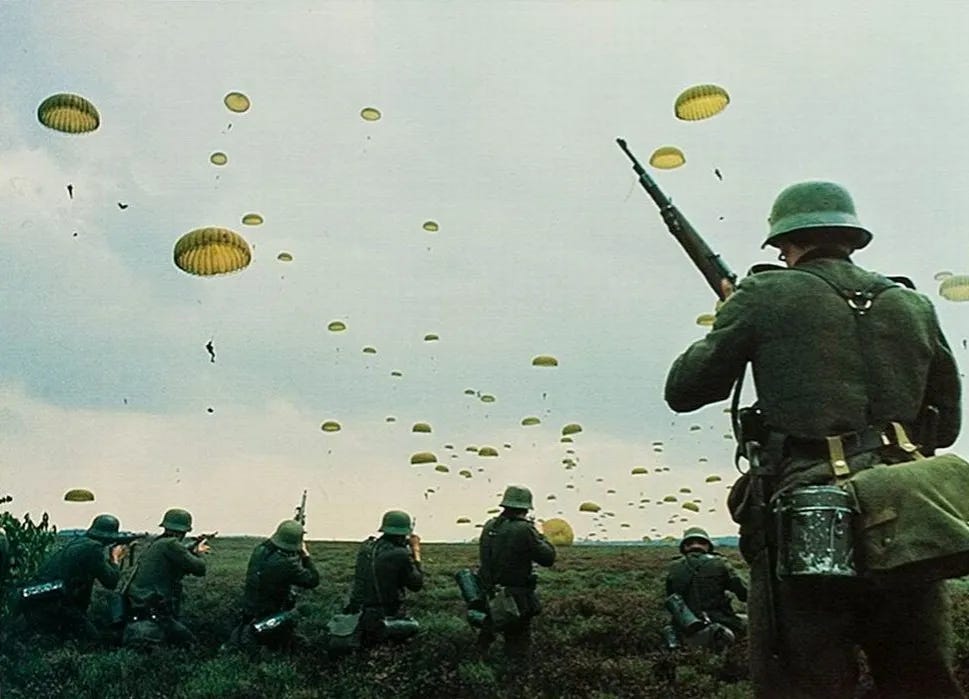At the College of Policing; a degree-sceptical officer is told he’s “going for a little rest”
Happy New Year.
As a 50-something Gen ‘X’ bloke of the ‘Airfix Generation’, one of my favourite films is (unsurprisingly) A Bridge Too Far, the 1977 epic concerning the catastrophe at Arnhem during the Second World War. In an early scene Major Fuller, an intelligence officer, tries to explain to his boss how aerial reconnaissance suggests an entire panzer division is camped near the British landing zones. Zones where they plan on dropping thousands of lightly-armed paratroopers.
Fuller’s Boss, General Browning, is having none of it; the operation’s too big. Too important. Reputations are riding on it. “It’s too late to stop the party,” Fuller’s told by a medical officer, who decides the pressure is all too much for the poor fellow. So, as the paras drop straight into the lap of II SS Panzer Corps, Fuller’s sent for some R&R to recover from that most egregious of ailments in any hierarchical organisation; being absolutely correct about the folly of a major, management-sanctioned project.
I was reminded of Major Fuller recently, after reading this article about the much-maligned and not-very-popular Police Degree scheme for new entrants. There are now so many ways of joining the police - cop a la carte, if you like - it makes my grumpy ex-copper head spin. Funnily enough, despite this cornucopia of career opportunities, officer retention is in the toilet and service delivery remains dire.
And so this week I’m going to muse on the Job’s uncanny knack of ignoring the completely obvious, especially when it comes to training and retention. I noticed an unusual level of ferocity around this debate in policing circles (LinkedIn is a bloody arena of passive-aggressive mayhem on the subject). On the one hand, you have people with skin in the game; lecturers, academics, trainers and the strange blob of police-o-crats who make a decent living on the periphery of law enforcement without doing any actual policing. They present themselves as progressive, believing the degree project is a panacea for the Job’s perceived lack of ‘professional status’ and a silver bullet in ‘changing The Culture.’ I’m sure any cost-savings (as these trainees start on lower salaries) are totally coincidental.
On the other side of this argument is… virtually everyone else, especially operational coppers. Why? Because the majority of police officers, until recently, weren’t graduates and never needed to be. Most of the outstanding coppers I’ve met didn’t have degrees, unless they’d studied for one after they joined. At this point you might think I’ve got a chip on my shoulder about graduate entrants. Nope. Although I’ve got more chips than the Casino Royale balanced on both shoulders, this ain’t one of ‘em.
You see, I joined the Met straight from college in my early twenties with a BA in History. Was it useful? Possibly. I think there are transferable skills between the discipline and, say, criminal investigation. Was it essential? Nope. Were most of the non-graduate students in my class at Hendon my equal, or better, in terms of performance? Yes.
Mind you, if we’d had a pop quiz on the Congress of Vienna I’d have won hands-down.
And so, J'accuse! The PCDA (Police Constable Degree Apprenticeship) is modern policing’s Arnhem and the College of Policing (as you might have realised, here at the Schloss Adler we aren’t a big fan) is General Browning. But who’s our Major Fuller? The Telegraph piece I linked above provides one, if only for the purposes of this article. Step forward, Nick Adderley, CC of Northamptonshire. Hey, what does Nick know about policing at strategic level anyway? He’s only a Chief Constable, right?
Nick Adderley: occasionally even senior police officers are right about stuff, but they get ignored by The Blob if they’re off-message
Back in 2021 Mr. Adderley warned the new system, which sees new officers spending part of their time policing and part of their time studying at college, said;
“When I speak to all of the cohorts who come in, I tell them quite clearly that this is not an extension of university. This is not an extension of sixth form college. This is a really serious business.” He said some were “a bit taken aback by their role”. In Northamptonshire, recruits have even walked out of training after undergoing sessions using a self-defence suit, saying they did not realise there would be that level of violence. They had also had officers saying they didn’t realise they needed to work evenings and weekends.
I’m sure I’m not the only ex-officer trained under the old system who had a genuine WTF moment reading that. We’re expecting very young people with limited life experience to put on a uniform, deal with the public while training and then go to college too, completing essays and dissertations and all that other stuff. It is, frankly, taking the piss if you ask me.
The upshot? A friend of mine’s son was interested in joining the police as a direct-entry detective. I offered the view he might want to do something else instead. Did I feel bad about that? Not really. I genuinely think he would be poorly served by joining at the moment, especially given the parlous state of local CID.
The Met, my old force, is offering three pathways into service for new officers (as opposed to direct-entry detectives or higher-ranking officers) -
The PCDA: The police degree route - work as a copper / study like a student, a uniquely unappealing hybrid. The drop-out rate (more of which later) is fairly depressing, but it’s too late to stop the party, right?
Pre-degree graduate entry: Yes, rock up with a degree in Media Studies and, magically, you don’t need a degree in policing like the non-grad saps. Why? I couldn’t become a nurse and cite my history degree as a qualification, could I?
Initial Police Learning and Development Programme (IPLDP): If you have ‘A’ Levels or equivalent, you can join under a more traditional route. Although nowadays, much of your training will be computer-based, teach-yourself-as-you-go. I met many IPLDP officers during my service. Few rated the experience.
Members of the criminal fraternity watch new police officers being dropped on their patch
Fair play to the Met, though, at least they’re offering different strokes for different folks. Other, smaller, forces like Northamptonshire might not have the same luxury. Which is why poor sods doing a week of nights followed by homework and assignment deadlines are dropping out. Just as Mr. Adderley warned in 2021.
Andy Marsh, from the College of Policing, offered this General Browning-like reply;
“Any suggestion that a large number of new police constable recruits, particularly those joining through the new entry routes, are leaving the service early is simply not backed up by the evidence.
“A survey of almost 4,000 new recruits earlier this year found a consistently high number of officers joining via the new entry routes indicated they wanted to continue in their career until retirement and were significantly more satisfied with their training.”
And so rookie officers are dropped into the lap of a panzer division. Don’t you love a survey? Notice how Mr. Marsh surveyed new recruits who said they wanted to serve until retirement before they’ve got five years in? Ask them after they’re less starry-eyed, mate.
Let me tell you a little story from the Met. It’s backed up by credible evidence - police resignations are up 72% in the past year. Mr. Marsh doesn’t mention that for some reason.
So I’m told, a young officer attended a retention meeting for newish officers to discuss career development. The fact the Met even runs such a thing is promising (when I worked there, nobody gave much of a shit whether you left or not), although of course it could equally have been a senior officer doing some competency box-ticking via ‘staff engagement’. I’m told the meeting was informal, with ‘Chatham House Rules.’
Anyhow, the policeman turns up and watches another young officer give a presentation about her experience completing initial training and probation (or whatever they call it now). She was described as ‘really bright and charismatic, there was something about her confidence. I thought she was a high-potential type.”
The Superintendent chairing the meeting also seem impressed by the cut of the officer’s gib. “Now you’ve finished training, what’s your next move?” he asked.
The officer replied she’d already been given a driving course and was planning on applying to become a surveillance officer. “And after that?” asked the Superintendent, “how do you feel about promotion, for example?”
The young officer smiled and shook her head. “Oh no,” she replied. “I’ll be leaving within five years.”
“Why?” asked the Superintendent incredulously.
At this point, apparently, the young officer raised an eyebrow at the strangeness of the question. “Why would I stay? The pay’s terrible, the hours are rubbish and it plays havoc with your mental health. Surveillance will be an interesting experience, I think, but I’m scouting out possibilities in the private sector.”
The Superintendent looked crestfallen, apparently. I have no idea why; this was the Brave New World proposed by Winsor, May and the Home Office in the 2010s. The police should be more open. Careers should be modular. Churn was good. An open market of skills and experience would increase diversity in representation and organisational thinking (oh the irony!). This young officer was only doing what the Blob wanted. Except the Blob, incredibly, thought she might come back to policing. Ha ha ha ha ha!
Hardly anyone goes back to policing. You get a few outliers, but they’re unusual. Officers who leave the police are often like cult survivors, amazed at how different freedom feels.
How much does it cost to train a surveillance officer from day one of joining the police to the point where you trust them with a Glock and a BMW? A small bloody fortune. Then they leave for the private sector. It’s an investment with virtually no return. Let’s not even start with officers trained in financial investigation, computer forensics, online investigation or any of the other commercially-attractive specialisms.
Bravo, College of Policing. Bravo.
I’m a big fan of change. When I was in the Met I used to annoy the fuck out of my bosses with suggestions about how we could do things differently. However, I’m also a big fan of preserving what works. It’s probably why I’m broadly supportive of a constitutional monarchy.
There must be a way of managing change without throwing the baby out with the bathwater. Sadly, UK Policing PLC has never managed it. Government talks a good game about subsidiarity and letting forces get on with it, but really? The same old College of Policing / Home Office cartel still issues diktat from the centre. Like police degrees / apprenticeships (which one is it, guys?).
I saw this writ large when they created the Met’s Counter-Terrorist Command in 2006 without thinking about the legacy functions of the Special Branch it partly replaced. This saw certain matters (for example, voting irregularities under the RPA) being investigated by ‘anti-terror police’ despite the awful optics that entailed. I remember Tony Blair used to refer to Gordon Brown as ‘The Great Clunking Fist’, as his Chancellor was notoriously stubborn and inflexible, refusing to acknowledge any fault in his plans.
That’s what police change programs feel like - a great clunking fist.
What was good about the old system, then? Why did they scrap it? I think it’s down to two ‘C’s’ - Cost and Culture.
I spent five months at Hendon Police Training College, and along with several hundred other trainees I was provided with (actually not bad) food and (terrible) accommodation… for free. It must have cost a fortune.
When they closed Hendon, they used it to film movies. Here it is in Avengers: Age of Ultron. The statue used to be of Sir Robert Peel. I lived in the tower block on the right-hand side of the picture.
Five months of residential training. A fair chunk of time. Was it great? Some of it was, some of it wasn’t. It had become a bit ‘pink and fluffy’, as these were the days of The Plus Programme, designed by Sir Peter (later Lord) Imbert to root out the infamous Canteen Culture. However, there were stringent requirements when it came to law and procedure. There were frequent tests and assessments. People could fail. I was warned about my attitude and told I had to change it or else. I did, and was praised for it.
The Hendon experience created a sense of esprit de corps, I suppose, which I guess was part of the problem. Early 90’s culture would probably give the average Gen ‘Z’ officer a heart attack. For example, there was a (male-only) barbers shop on the ground floor of one of the accommodation blocks. The reading material on offer for customers consisted of dog-eared pornographic magazines. Nobody found this remotely unusual, which I do now. The past is another country; they do things differently there.
Anyhow, we marched around. We saluted senior officers. We polished our boots. We were issued whistles, horrible serge trousers and arrested actors outside our pretend police station. It was a little paramilitary, although anyone who’d endured basic army training found it astonishingly easy. The self-defence and physical training was pathetic. At the end, we were sent to our police stations where we spent 12 more weeks being closely supervised (one-on-one) before being allowed to patrol on our own.
So far, that’s 8 months’ training, right?
Then, for another 16 months you were still a probationary constable, which meant it was relatively easy to sack you if you fucked up. You made tea for the rest of the shift and weren’t allowed to drive police cars. You took all the shitty jobs. Every few months you went to a regional training centre for continuation training (which, to be honest, wasn’t particularly helpful). It wasn’t a perfect system, but nothing is. But it cost a fortune and was probably part of a police culture many saw, as the kids say nowadays, problematic.
The good bits - rigour in learning, camaraderie, shared experience and the possibility of failure were sacrificed, besmirched by the bad; the cost of residential training and a beery paramilitary culture.
I think senior officers like the College of Policing’s Andy Marsh (who joined the police in 1987, five years before me) remind me of 1990s American generals, scarred by their experience of the Vietnam war. It made them risk-averse. Always expecting failure. Bruised by unpopularity at home
They, quite understandably, didn’t want to see the mistakes they’d endured suffered by new colleagues. When the Americans deployed to the Balkans in 1999, they spent most of their time in armoured vehicles, watching havoc unfold around them. Too scared of their own shadow. Fighting the last war, like all generals do. It’s also why it’s too late to stop the Party, because there’s too much at stake.
The irony is the pearl-clutching disdain for nostalgia - of the bad old days - is also part of the problem. It’s why, with good intentions, they’re dropping young recruits into hostile landing zones. There’s a denial of what went before, an inability to see the obvious. To concentrate on what was bad and wilfully ignoring the good. Stuff like representing the people we serve - something that’s endlessly discussed as a priority. Policing is unique. It requires some brains. Some brawn. A lot of commonsense. The ‘Police are the People and the People are the Police,’ right?
And not all people are graduates.








Excellent article. I joined in 1972 with lots of ex Armed Forces who like me had no degree. Andy Marsh and his now wife Nicki Watson joined my force when I already had many years of experience and was climbing the slippery pole of promotion. It was clear from early on that they and a group of other chosen graduates were being pushed to succeed at the expense of others like me vying for the same posts.
I worked with many brilliant officers most of whom had few academic qualifications, but like me had cunning and guile on their side. I never felt academically inferior to any graduate or non graduate.
I was lied to many times by senior officers and held back for later promotions but eventually supported by a great Ch Supt and by a back door route retired as a Supt.
The job gave me transferable skills that earned me lots of money afterwards, even without a degree.
The police and Govt are reaping what they sowed, by promoting an ethos of professionalism but actually hollowing out the skill base, forcing some officers over 30 years into retirement, decimating the numbers and trying to paper over the gaps with Specials and PCSOs. Meanwhile service to the public has declined and its reputation has tanked. Adding insult to injury, they now insist on degree qualified or level candidates effectively excluding some of the best potential officers they could recruit. Glad I’m out of it but sad at what it’s become.
Another excellent article, spot on as ever.
I too trained at Hendon in the early 90s and remember it fondly (sort of ...).
I studied for my degree whilst serving, for personal satisfaction rather than ‘career progression.’
I look on with dismay at new recruits, these are their ‘good old days’ and wonder what’s to come next. Worse before it gets better I suspect.
I’m out now. TJF, as it has been since 1829 I suspect.